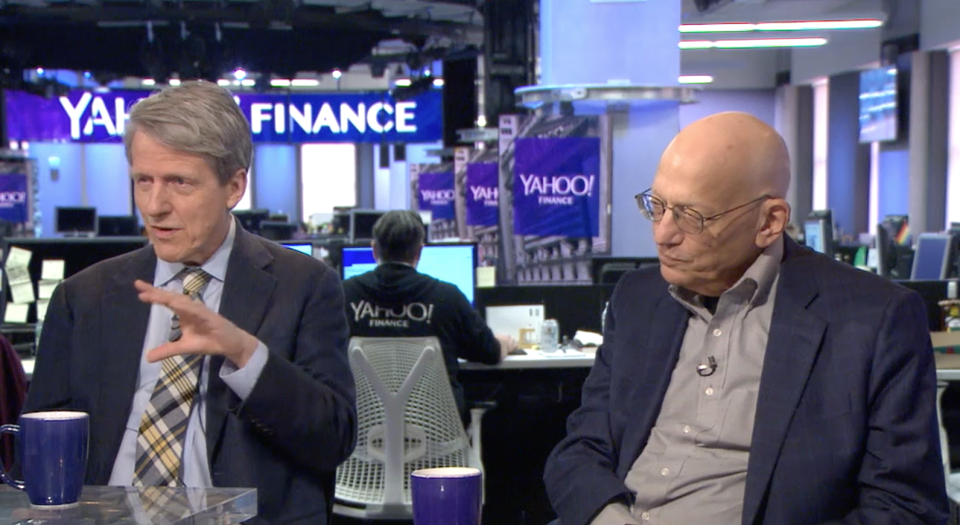Jeremy Siegel and Robert Shiller tell us what's next for the economy
The US economy has been expanding for eight years. This recovery has been accompanied with the bull market which has sent stocks to all-time highs.
So, what’s next for the economy and the markets?
“You have to remember that we have had a historic repetition of recessions … Exactly how many years between recessions is not precise but it was almost 10 years ago that the 2007-2009 recession began, so we’ve had a long expansion. And historically recessions come with a surprise,” economist Robert Shiller said.
Shiller added that the market does bear some similarities to 1999, which preceded a sell-off and a recession.
“I have a valuation confidence index on my website, which is the percent of the people that think the market is not overvalued. I’ve been doing that since 1989. That reached its lowest right there in 1999. Right before the dot-com bubble burst. People were not confident that the market was well-priced … Now we’ve come back to another low-valuation confidence,” Shiller said. “I can tell you that people think the market is highly valued and what they think matters for their behavior. So it looks like we might be more back to 1999 than we are making out.”
His peer Jeremy Siegel, though, sees more anxiety among investors in today’s market, which could mean less risk of a correction going forward.
“It took us over a quarter century from the ’30s before people began to tip-toe back to the stock market. We’re less than 10 years out and there’s still a lot of skepticism,” Siegel said. “When I talk to a lot of people, I don’t get the same feeling I got in ’99 when they were just rushing into these internet stocks. I get a much more cautious view.”

Shiller conceded that there is more fear in the market today versus in 1999.
“In the US, everything is expensive. Housing has gotten expensive, bonds are highly priced, and the stock market is highly priced. It kind of suggests to me a willingness to hold assets. And I think it’s partly driven by fear. And this is what’s different with 1999,” Shiller said. “We’re much more worried about our jobs now or our children’s jobs. We’d like to have a house for our children because they might not be able to afford it.”
GDP backdrop
This all comes amid a low-growth backdrop and the perplexing question of such slow GDP growth despite a jobs recovery.
“Given the job growth, if we had historical productivity growth, we’d be 4% or more [GDP growth],” Siegel said. That would outpace President Trump’s repeated goal for achieving GDP growth upwards of 3%.
Meanwhile, Shiller said that GDP growth may not be the best barometer of overall economic health.
“Right now the defects of GDP as a measure of human welfare are more apparent. We’re actually living a pretty good life,” Shiller said. “The internet gives you so many things for free that we love.”
The importance of global economy
Siegel said Trump’s lack of follow-through with rolling back trade deals has been a positive for the market and economy.
“One of the things that’s pleased the market — and the reason I think it’s rallied — is although Trump has been big on talk on trade, so far he has not pursued a real aggressive and that would be really negative for the economy if he did,” Siegel said.
Siegel pointed out the Mexican peso, which sold off significantly after the election, has come back.
“That’s really important because we live in a global economy and the markets wouldn’t be good and the economy wouldn’t be good if we started clamping down on trade.”
However, Shiller said when it comes to international relations Trump is unpredictable.
“I think the biggest worry is that Trump makes some kind of mistake that antagonizes someone, that starts some conflict,” Shiller said. “Business thrives on the sense that it’s peace time, everyone respects each other and sometimes Trump can be insulting”
For more from Shiller and Siegel:
Robert Shiller and Jeremy Siegel tell us what they think of each other’s market forecasts
Robert Shiller and Jeremy Siegel share what they think of unusually low volatility
Jeremy Siegel: ‘On the whole, we have nothing replicating 1999’
Siegel: If Trump doesn’t bring reform we could have trouble in the markets
Robert Shiller and Jeremy Siegel face off and answer 7 key questions
Nicole Sinclair is markets correspondent at Yahoo Finance
Please also see:
How Marriott plans to beat Airbnb in winning over Chinese travelers
Fast food chains are coping with their labor cost problem
Short-sellers have lost $7.1 billion betting against this year’s hottest tech stocks
America doesn’t need to be the world leader to prosper

 Yahoo Finance
Yahoo Finance 
